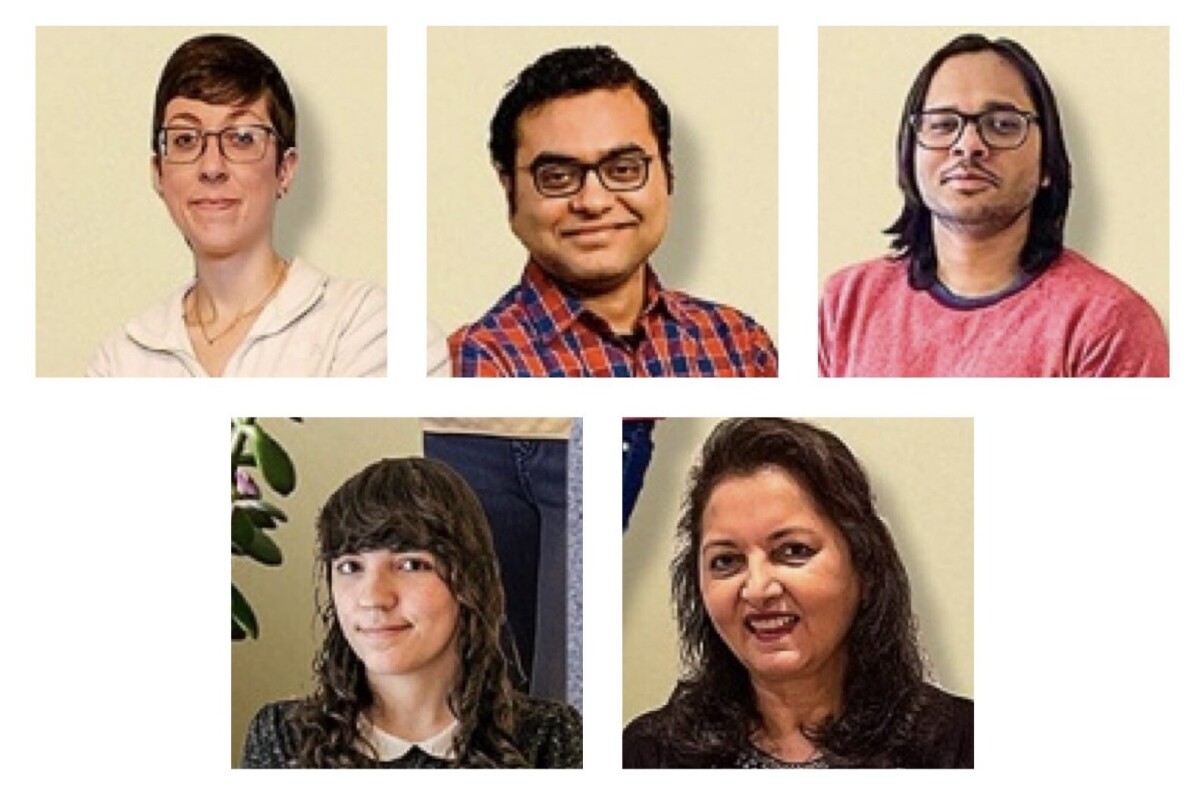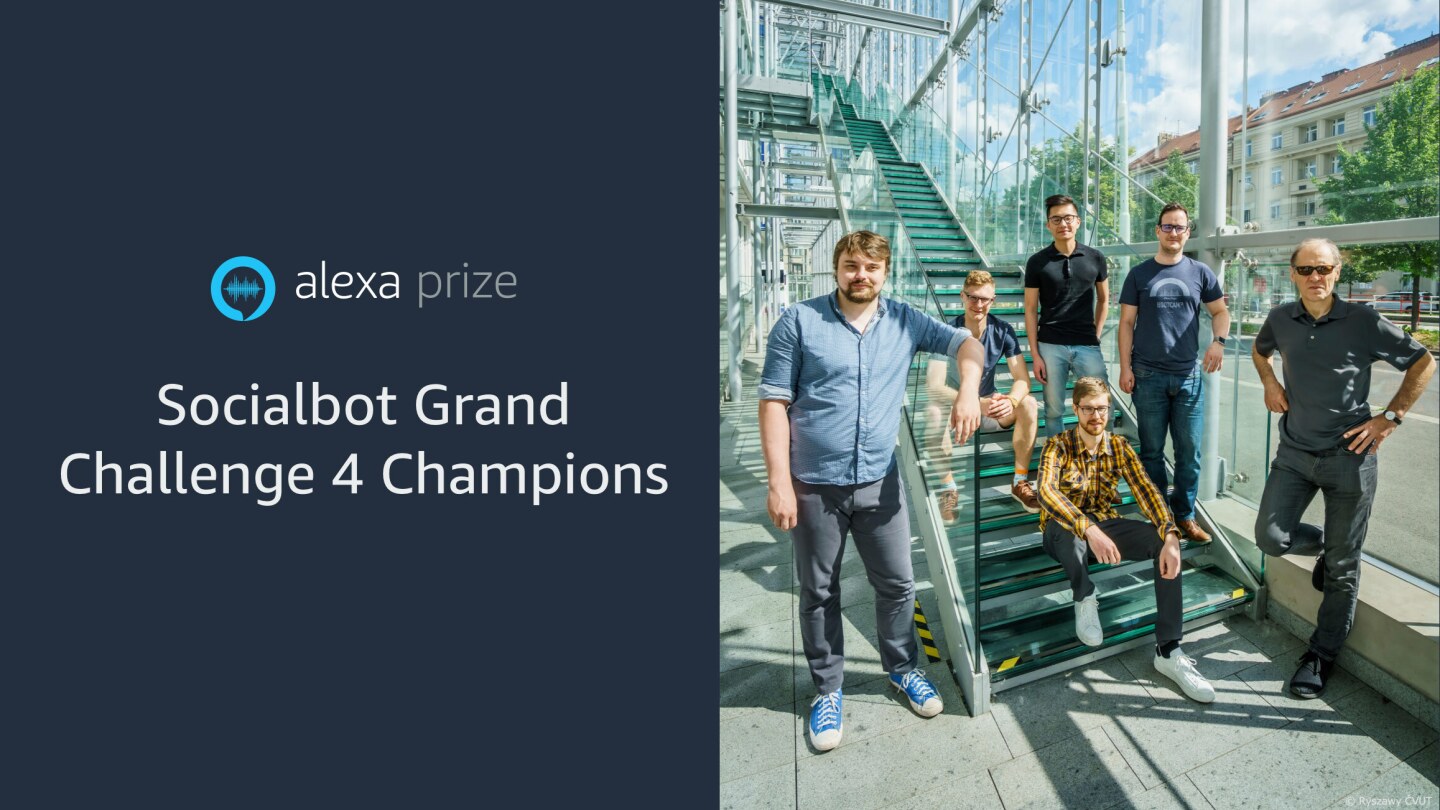The Czech Republic captured four gold medals at the 2021 summer Olympics in Japan, quite a feat for the Central European country with a population of just over 10 million people.
The country now has another gold-medal-winning team — Alquist from Czech Technical University (CTU) in Prague, which today learned it is the winner of the 2021 Alexa Prize SocialBot Grand Challenge.
“We are incredibly excited to learn that we have won this year’s competition,”said Jakub Konrád, a CTU PhD student and Alquist’s team leader. “I am delighted and proud of our entire team for building a bot that managed to reach the finals for the fourth consecutive year. This year we strove to create a system capable of flexible conversation by synthesizing generative approaches with prepared scenarios that could adjust to users’ needs.”
Faculty advisors provide their perspectives
Faculty advisors to each of the finalists provided their perspectives on the Alexa Prize Socialbot Grand Challenge 4 competition. Learn more about their insights, and read the teams' research papers.
The team’s faculty advisor, Jan Sedivy, added that this year’s team had great fun designing “catchy and attractive dialogues”, and that the team already is looking forward to joining the next challenge.
The Alexa Prize SocialBot Grand Challenge, launched in 2016, is a competition for university students dedicated to advancing the field of conversational AI. Teams are challenged to design socialbots that Alexa customers can interact with via Alexa-enabled devices. The ultimate goal: meet the Grand Challenge by earning a composite score of 4.0 or higher (out of 5) from competition judges. Additionally, the finals’ judges must determine that at least two-thirds of their interactions with the socialbot were coherent and engaging for a minimum of 20 minutes. The first team to meet the Grand Challenge will win a $1 million research grant for its university.
Although none of this year’s teams met the Grand Challenge, each finalist demonstrated impressive progress toward the goal. Alquist, the socialbot from CTU, earned first place with a 3.28 average rating, and an average finals’ competition interaction duration of 14 minutes and 14 seconds. For the second consecutive year, Stanford University’s Chirpy Cardinal socialbot earned second-place honors and a $100,000 prize by achieving a 3.25 average rating, and an average of 13 minutes and 25 seconds of interaction duration. PROTO, the socialbot from the University of Buffalo team, earned third-place honors with an average rating of 3.16, and an average of 14 minutes and 45 seconds of interaction duration.

“Team Chirpy Cardinal really enjoyed participating in the Alexa Prize for the second time,” said Ethan Chi, a research assistant within Stanford’s NLP Group, and team leader. “Throughout this experience, we've learned so much about real-world dialogue. We almost completely rebuilt our system from the ground up, allowing us to handle a greatly expanded variety of user comments and interjections, and we developed new neural techniques to blend factual knowledge fluidly into our conversations. We even integrated news from The Guardian into our system, allowing us to build common ground with our users over recent events. Compared to our socialbot's previous incarnation, we more than doubled our average finals conversation length, bringing us closer to our shared goal of fluent conversational AI.”
“From an innovation perspective, our aim was to create an agent that wouldn’t restrict interaction to a defined set of topics,” said Sougata Saha, a PhD student at the University of Buffalo, and PROTO’s team lead. “Our use of an ensemble of factual and chit-chat neural generators, coupled with a robust dialogue manager, helped us achieve our third-place finish.”

Last November, nine teams were selected to participate in the competition, and in July five finalists were selected to compete in the finals competition, which took place July 27-29. The finals competition also included teams from Emory University, and The University of California, Santa Cruz.
“Building open-domain conversational systems that allow customers to engage on topics ranging from sports and entertainment, to politics and technology is an incredibly challenging task,” said Prem Natarajan, Alexa AI vice president of Natural Understanding. “Creating socialbots that can conduct these kinds of multi-turn, open-domain interactions is still far from a solved problem. The fact that the top teams participating in this year’s finals competition more than doubled the average duration of interactions over the previous challenge demonstrates that we continue to make impressive progress toward that goal.”
Each of the nine teams participating in Alexa Prize Grand Challenge 4 has published a research paper outlining their approaches to this year’s competition. The papers are now available on the Alexa Prize website.
Since 2017, Alexa customers have engaged with Alexa Prize socialbots for more than 900,000 hours. Alexa customers can continue to engage with the winning teams’ socialbots simply by saying, “Alexa, let’s chat.”
Previous challenge winners include teams from the University of Washington, the University of California, Davis, and Emory University.
Alexa Prize program expands
The Alexa Prize program has expanded to include another competition, as well. Earlier this year, Amazon launched the Alexa Prize TaskBot Challenge, in which 10 participating teams are competing to develop agents that assist customers in completing tasks that require multiple steps and decisions. It is the first conversational AI challenge to incorporate multimodal (voice and vision) and interactive customer experiences. The year-long competition concludes in May 2022, with winners announced the following month.
More information about the challenge is available on the competition’s frequently asked questions page. Alexa customers will have the opportunity to interact with the taskbots beginning in October 2021.
In the coming months, Amazon Science will have details on the forthcoming Alexa Prize Socialbot Grand Challenge 5.


















